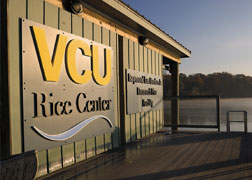Capital campaign funds VCU Rice Center additions
With a rich history of providing sustenance to early American inhabitants, the James River serves as a present-day home to endangered and rare species such as the Atlantic sturgeon and the bald eagle. The Virginia Commonwealth University Inger and Walter Rice Center for Environmental Life Sciences not only helps preserve this treasure trove, but it also furthers the knowledge that helps improve preservation efforts worldwide. Through a $10 million capital campaign, the center now aims to add additional research facilities and to create a place for scientists and policymakers to meet on site.
The Rice Center is less than a half-hour’s drive from VCU in Charles City County, Va. Inger Rice, a longtime friend of VCU, made the environmental research and education center possible through a generous land donation.
“A developer from Florida wanted to take down all of the trees,” Rice said. “I thought that was absolutely horrible and wanted to preserve the natural beauty.”
In 2000, she approached VCU with an idea to maintain the environment while dedicating the 343 acres to research and education.
“It’s amazing how VCU has moved forward and kept the idea going. I’m very impressed,” she said.
Rice later provided funds to establish an education facility to accommodate the VCU Rice Center’s growing programs. Further additions include an outdoor classroom, a boathouse and pier, the Virginia Department of Game and Inland Fisheries Region I headquarters building, and research infrastructure allowing for the continuous collection of water-quality and meteorological data.
The $10 million campaign aims to enrich Rice Center operations by adding a state-of-the-art research building, on-site lodging for researchers and students, laboratory equipment and graduate student scholarships. All of these measures will help fuel the model example of collaboration the Rice Center provides.
“The VCU Rice Center is part of VCU Life Sciences’ universitywide matrix, offering undergraduate and graduate students the benefits of a highly interdisciplinary approach across the whole range of the biological scale, molecular to landscape,” said Thomas F. Huff, Ph.D., VCU’s vice provost for life sciences.
External alliances with multiple federal and state agencies, as well as with the College of William and Mary through the Center for Conservation Biology, help advance the understanding, conservation and stewardship of Virginia’s natural resources. The vision for the center is one of international leadership in environmental research and teaching that is focused on rivers and other water resources.
“Rivers are important from almost every aspect of life,” said Dr. Daniel W. Fort, chairman of the VCU Rice Center board of trustees. “It’s important to maintain them in a safe way and preserve them from abuse. If we can do anything to prepare ourselves to deal with problems that come up from a research point of view, then we’ve done a lot.”
The creation of an Atlantic Rivers Institute at the center will bring scientists and policymakers together in a single location.
“There are very few organizations with our capacity to do the necessary research on site,” Fort said. “The addition of the new research facility will make it the most sophisticated institute for the study of large rivers anywhere. An investment in the VCU Rice Center is an investment in the world’s largest living laboratory.”
To make a gift to the VCU Rice Center, contact Catherine Dahl, director of development and special programs for VCU Life Sciences, at (804) 827-7372 or ccdahl@vcu.edu.
